Vegetables are always a good idea. They provide a wide array of vitamins, nutrients, and minerals, and they're chock full of antioxidants. In fact, research has shown that incorporating more vegetables and fruit into your daily diet can help lower your risk of disease. And one of the main contributing factors to these amazing health benefits of vegetables is the amount of fiber found in them, with some higher-fiber vegetables having upwards of 7 grams per serving.
"Incorporating high-fiber vegetables into your diet can contribute to overall health, support digestion, and provide a range of vitamins and minerals essential for functioning," says Amy Goodson, MS, RD, CSSD, LD. She also adds that "Each color of vegetables packs a different nutrient package, so consuming a variety of colors in your diet is ideal."
Even though all vegetables provide their own unique health benefits and blends of vitamins and minerals, those who are aiming for more fiber in their daily diet can benefit from knowing which high-fiber vegetables to choose.
Read on to learn which veggies have the highest amount of fiber, ranked in order from lowest to most, as well as all of the benefits these veggies can provide. We also list the percent daily value each serving size provides, which is based on a recommendation of 28 grams of fiber per day.
Cauliflower: 2.1 grams (8% DV)
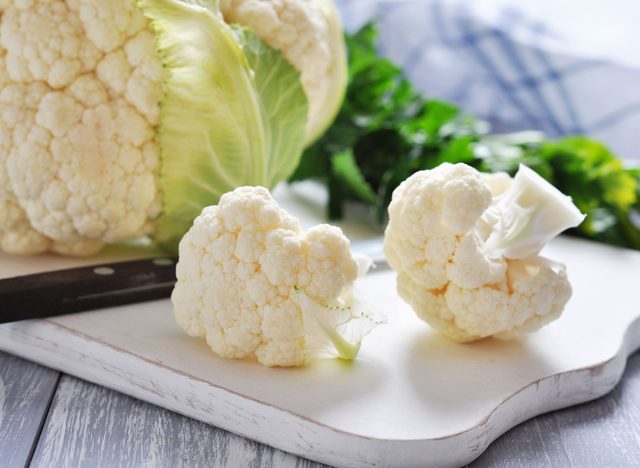
Cauliflower is a versatile vegetable used in many recipes, especially for those who eat it as a rice or pasta replacement when trying to lower their refined carbohydrate intake.
"It is a nutrition powerhouse, chock full of fiber, vitamin C, vitamin K, and folate, and is also an excellent source of the mineral potassium, which is good for the heart," says Lisa Young, PhD, RDN. "It's also very low in calories, so you don't have to worry about eating too much."
Young adds that along with cauliflower rice, another option is "to cut calories in your favorite side dish by making mashed cauliflower instead of mashed potatoes."
Carrots: 3.6 grams (13% DV)
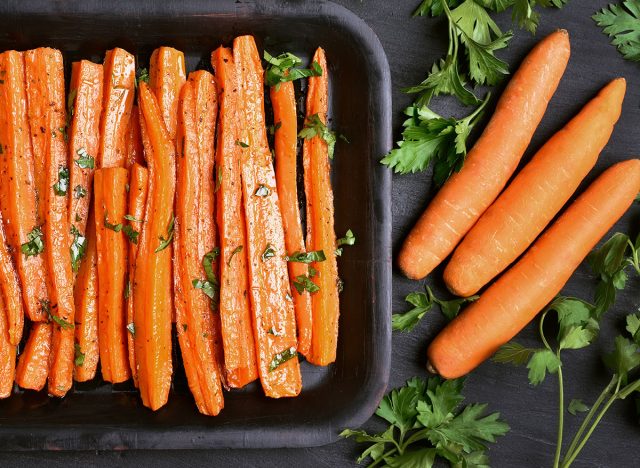
Carrots deliver 3.6 grams of fiber per cup, making them a great high-fiber vegetable choice. However, this veggie is full of many more health benefits than just fiber.
"Carrots promote eye health, support digestion, and are rich in beta-carotene—an antioxidant," says Goodson. Not only that, but Young adds that the "soluble fiber in carrots helps regulate blood sugar levels while insoluble fiber aids digestion and promotes regular bowel movements, and the consumption of carrots can contribute to weight management, as its fiber content helps you feel full and will prevent overeating."
Sweet potatoes: 3.8 grams (14% DV)
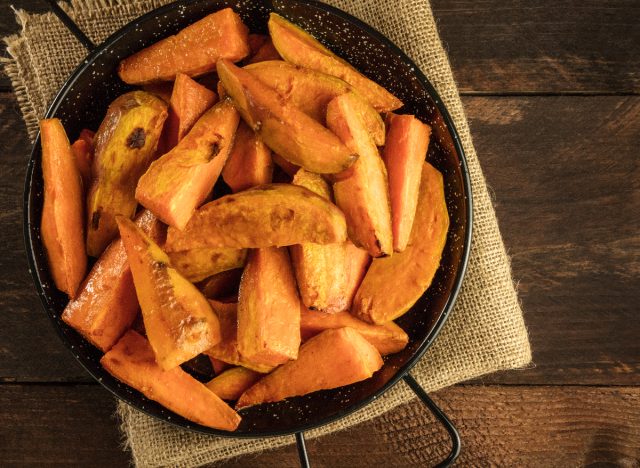
3.8 grams of fiber per medium sweet potato
When you need a boost of fiber, try switching out your white or yellow potatoes for sweet potatoes, which come with almost 4 grams of fiber.
"High in fiber and rich in vitamins A and C, sweet potatoes support immune function and vision, and may help regulate blood sugar levels," says Goodson. One of the main antioxidants in sweet potatoes is beta-carotene, and "this powerful antioxidant is converted to vitamin A in the body, which is beneficial for our vision, and vitamin A is an essential vitamin for our immunity as well," says Young. "Ultimately, it helps our heart, lungs and other organs function properly."
Another antioxidant found in sweet potatoes—known as anthocyanin, "can improve brain function by reducing inflammation and fighting free radicals," adds Young.
Brussels Sprouts: 4.1 grams (15% DV)
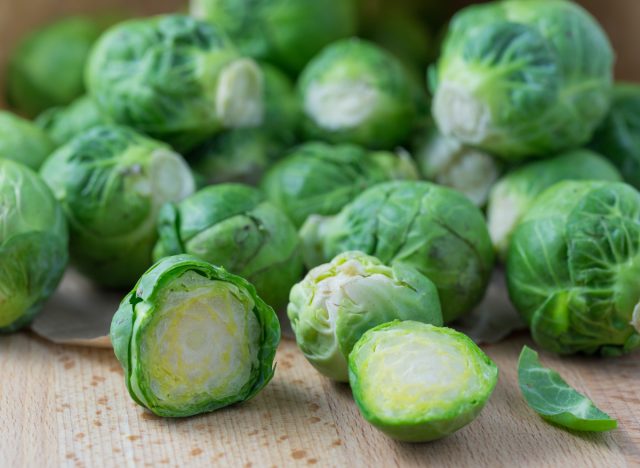
"Brussels sprouts are nutrient-dense and have a high fiber content, so they help maintain a healthy digestive system and help to control appetite for weight management," says Young. Goodson also adds that Brussels sprouts are high in vitamin K, which means they can "support bone health, heart health, and may have anti-inflammatory effects as well."
With over 4 grams of fiber per cup, incorporating Brussels sprouts into a meal every now and then can help your health tremendously. "Its fiber content plays a role in blood sugar control by slowing down the digestion and absorption of carbohydrates, preventing blood sugar spikes," says Young. "Consumption is also associated with heart health and helps to reduce the risk of cardiovascular diseases."
Spinach: 4.3 grams (15% DV)
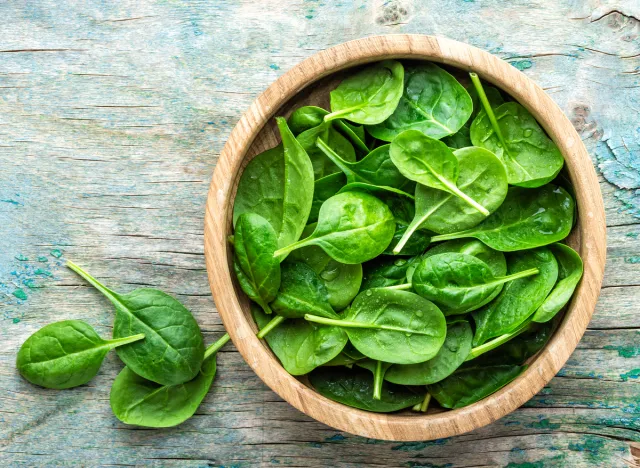
4.3 grams of fiber per cup of cooked spinach
Whether you're eating a spinach salad, throwing some into a smoothie, or sautéing some up in olive oil, spinach can give your body a boost of fiber, as well as a handful of other helpful nutrients. "Spinach supports bone health and heart health, and it is rich in antioxidants like vitamin C and beta-carotene," says Goodson.
"One cooked cup of spinach delivers about 4.3 grams of fiber, along with a wealth of vitamins and minerals, including iron and vitamin K, which are important for blood health and bone strength," says Trista Best, MPH, RD, LD at Balance One Supplements.
Kale: 4.7 grams (17% DV)
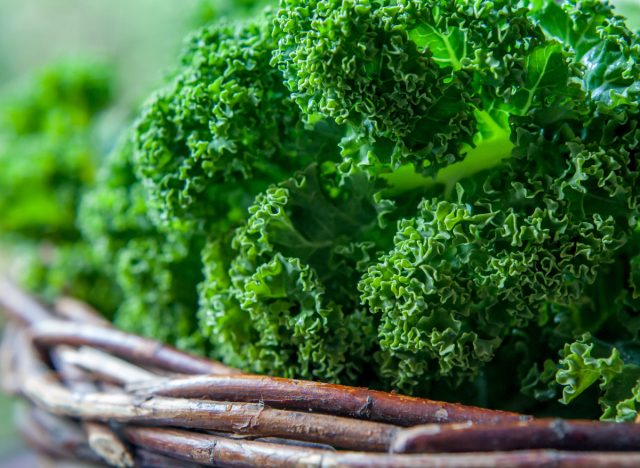
4.7 grams of fiber per cup of cooked kale
Similarly to spinach, kale is another versatile leafy green that can be eaten raw, cooked, or blended into a smoothie, and regardless of how you eat it, you'll get a few extra grams of helpful fiber.
"Kale is a nutrient-dense leafy green rich in vitamins A, K, and C, as well as compounds with potential anti-inflammatory effects," says Best. Goodson agrees, saying that kale is "loaded with fiber, vitamins, and minerals, and can support vision, bone health, and may have antioxidant properties" as well.
Broccoli: 5 grams (18% DV)
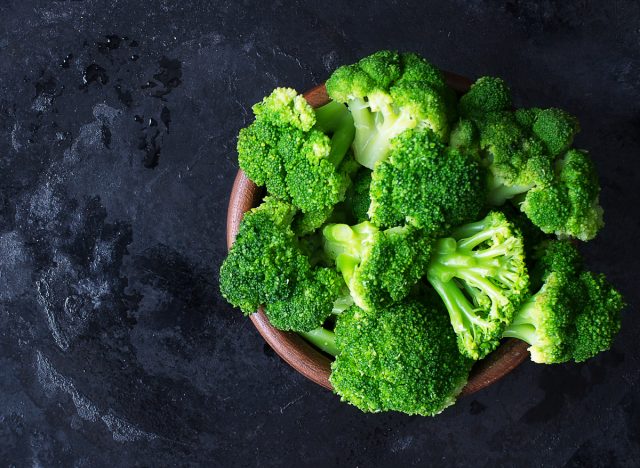
Young says that one of her favorite vegetables is broccoli, and it makes sense when you look at its health benefits. "A cruciferous vegetable from the Brassica family, broccoli is high in the antioxidant vitamins A and C, the mineral calcium, fiber, and is also rich in sulforaphane, a health-promoting compound that can help ward off cancer," says Young.
Goodson adds that because of these traits, "broccoli supports immune function, bone health, and may have cancer-fighting properties."
Artichokes: 6.8 grams (24% DV)
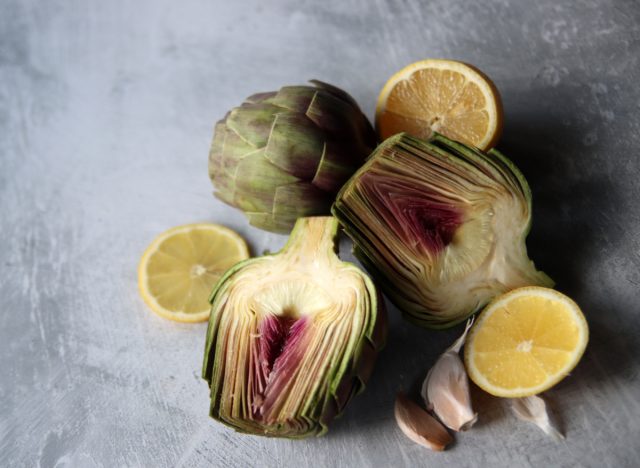
6.8 grams of fiber per medium artichoke
Artichokes may not be as commonly eaten as something like broccoli, kale, or spinach, but this vegetable is packed full of fiber, with almost 7 grams per artichoke. Aside from fiber, artichokes also contain antioxidants "and support digestion, liver health, and may help reduce cholesterol levels," says Goodson.
Best adds that they are also "rich in prebiotics, which helps promote a healthy gut microbiota, and their antioxidants may help protect cells from damage."
Peas: 7.2 grams (26% DV)
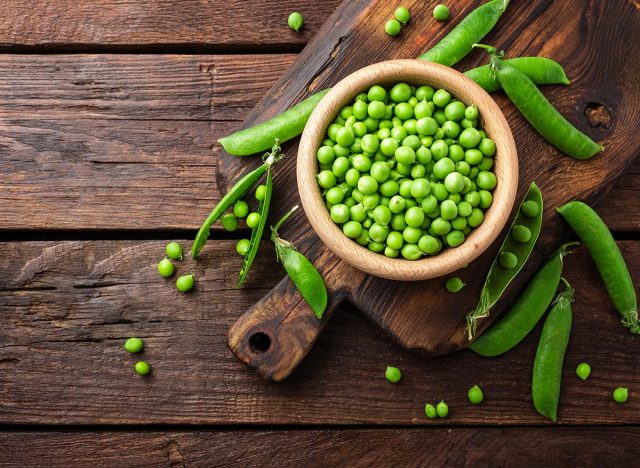
The winner of our ranking and the highest-fiber vegetable is the small but mighty pea! With over 7 grams of fiber per cup, this veggie is the perfect addition to rice, pasta dishes, and salads.
"Packed with dietary fiber and protein, peas contribute to muscle health, support blood sugar regulation, and provide vitamins and minerals," says Goodson.
No comments:
Post a Comment